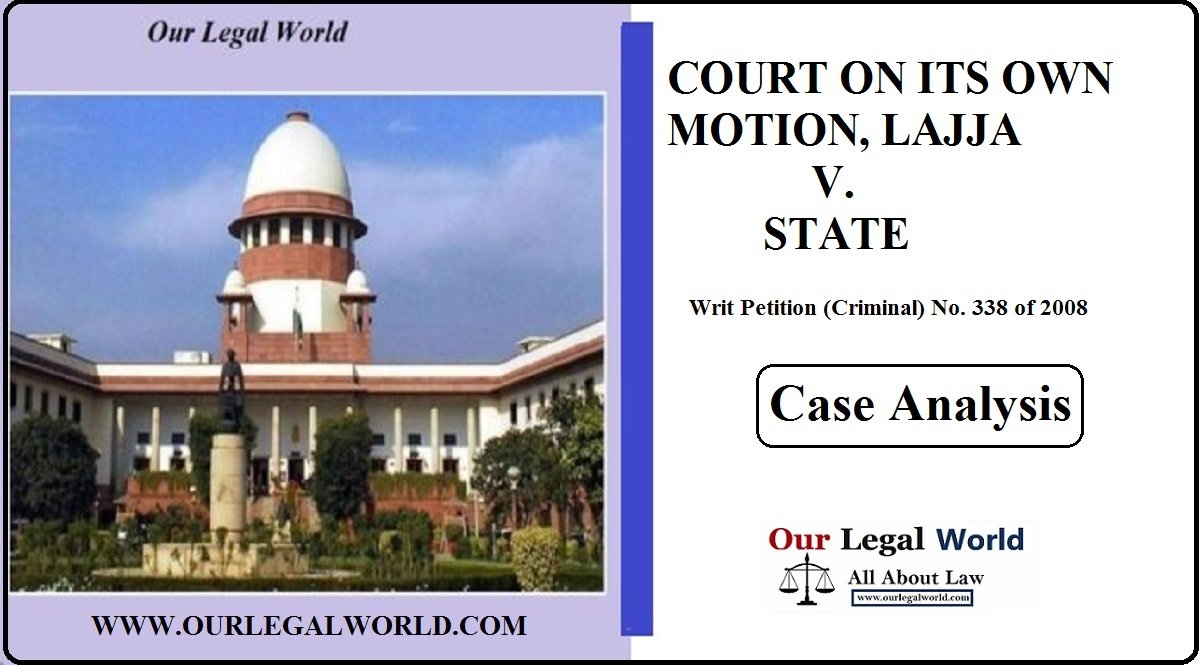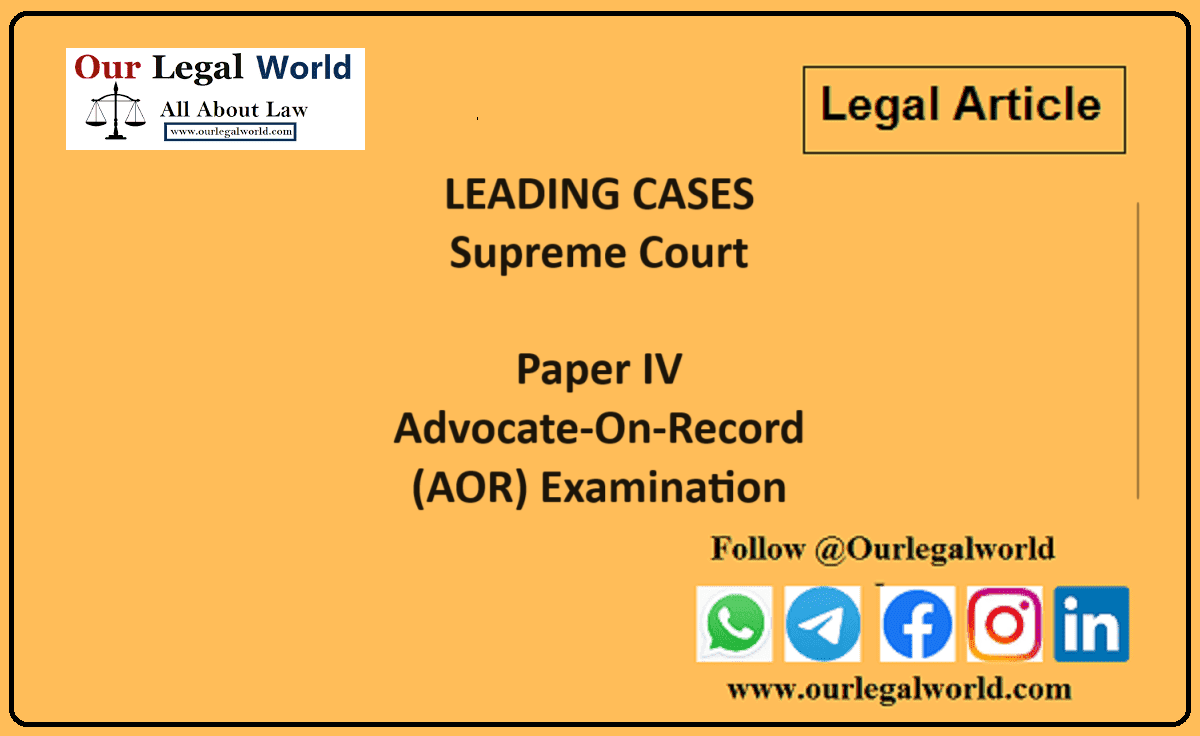COURT ON ITS OWN MOTION, LAJJA V. STATE: Case Study
IN THE HIGH COURT OF DELHI AT NEW DELHI Writ Petition (Criminal) No. 338 of 2008 Petitioner: Lajja Devi Respondent: State Date of Judgement: 27 July, 2012 Bench: Justice A.K. Sikri, Justice Sanjiv Khanna, Justice V.K. Shali
Introduction
COURT ON ITS OWN MOTION, LAJJA V. STATE
Case Study
There can be nothing more appalling for a growing society than to see children, who are defenceless and unable to voice out the wrongs happening to them, being subjected to various forms of sexual crimes and mental harassment which scar them for life. One such horror is child marriage. Child marriage refers to the age-old practice of families marrying their children off at a very tender age without taking their emotional needs and physical, psychological health into consideration. United Nations recognizes Child marriages as gross violation of Human Rights. As per UNICEF Reports, 27% of the girls in India are married before they reach the age of eighteen. Child marriage is both the reason and result of deep- rooted patriarchy of our society. Numerous legislations have been passed to curb this social evil of marriage of minors. Nevertheless, at the rural and marginalized sections of the society, this practice is still rampant. It is often the result of lack of awareness and adequate education about children health and the poor implementation and loopholes of the legislations, that the issue is still eating us up. This paper analyses such loopholes in the legislations concerning marriages of children and the need to take adequate steps to correct the wrongs, with the basis of a 2012 case, Court on Its Own Motion, Lajja Devi v. Statei. Any mistakes found herein, are the human errors of the author and not of any of the references quoted.
Facts of the case
A letter addressed to the Hon’ble Chief Justice by one Smt. Lajja Devi alleged that her daughter Ms. Meera, aged 14 was kidnapped by four persons namely Pramod, Vinod, Satish and Manoj while she had gone to Delhi to meet her maternal uncle. This letter was treated as a writ petition and FIR was registered against the accused persons, as a consequence of which, the local police arrested one Charan Singh and retrieved Ms. Meera, only to find that both had been staying together for the time being. A statement of Ms. Meera under s.164 CrPC was recorded, wherein she informed the Metropolitan Magistrate that she went and solemnized marriage, as per Hindu rites and ceremonies, with the accused, Charan Singh out of her own will as her uncle and aunt were trying to marry her off to someone else.
It was found that Ms. Meera, at the time of the incident was only 13 years of age. Unwilling to return back to her parents, she was sent to Nirmal Chhaya in judicial custody. However, once the hearing began, she agreed to return back to her parents with the assurance of not marrying her off to someone else. On the other hand, family of the husband, Charan Singh, also demanded the custody of Ms. Meera. Other petitions involving similar questions of law, were also combined and heard along with this writ petition.
Issues raised –
- Whether a marriage solemnized by a man of or over twenty-one years of age and girl below eighteen years of age be said to be a valid marriage and can the custody of such minor female be given to the husband or his family?
- Can such minor female be said to have reached the age of discretion to walk away from the guardianship of her parents and refuse to go back? If yes, can the state keep her custody?
- Whether FIR registered against the accused persons, in such cases, under section 363 or section 367 of the Indian Penal Code, be quashed solely on the basis of the statement (wherein she mentions that she consented to the marriage) of such minor?
Law(s) involved-
- Section 3 of the Prohibition of Child Marriage Act 2006 ii, hereafter referred to as the PCM Act, 2006 which states, “Every child marriage, whether solemnised before or after the commencement of this Act, shall be voidable at the option of the contracting party who was a child at the time of the marriage, provided that a petition for annulling a child marriage by a decree of nullity may be filed in the district court only by a contracting party to the marriage who was a child at the time of the marriage or by her guardians or next friend along with child marriage prohibition officer.”
- Section 9 of the PCM Act, 2006 talks about punishment for an adult male marrying a child, “Whoever, being a male adult above eighteen years of age, contracts a child marriage shall be punishable with rigorous imprisonment which may extend to two years or with fine which may extend to one lakh rupees or with both.”
- Section 5(iii) of the Hindu Marriage Act, 1955 iii which mentions, “the bridegroom has completed the age of twenty-one years and the bride, the age of eighteen years at the time of the marriage.”
- Section 6(c) of the Hindu Minority and Guardianship Act, 1956 iv which states, “in the case of a married girl—the husband: Provided that no person shall be entitled to act as the natural guardian of a minor under the provisions of this section.”
- Section 363 in The Indian Penal Code, 1860 v which defines the punishment for kidnapping, “Whoever kidnaps any person from 1[India] or from lawful guardianship, shall be punished with imprisonment of either description for a term which may extend to seven years, and shall also be liable to fine.”
Earlier judgements
Neetu Singh v. State and Ors. 1999 vi – In this case, the validity of an order passed by the metropolitan magistrate, to send a minor to Nari Niketan against her will, was questioned. The Division Bench then quashing the order of the metropolitan magistrate, observed that marriage of a minor is neither void nor voidable under section 5 (iii) of the Hindu Marriage Act, 1955 and the only provision that could be applicable here was section 18 of the Act, as per which the accused was sentenced to a fifteen-day imprisonment along with a penalty of Rs. 1000. The minor’s custody was given to her husband. The bench while giving this judgement, referred to two other High Court judgements, namely, Kalyani Chaudhary v.
State of Uttar Pradesh and Simran Kaur v. State of Himachal Pradesh. However, these cases did not take into consideration the Child Marriage Restraint Act, 1929 (Now, Prohibition of Child Marriage Act, 2006).
Sunil Kumar v. State of NCT Delhi and Anr. 2007 vii– Herein the petitioner was accused of kidnapping a minor named Urmila Devi and getting her married to his brother, Ram Prasad. Statements of both Urmila Devi (minor) and Mr. Ram Prasad were recorded and the court allowed the minor to reside with the alleged kidnapper and his family on the ground that the minor in the said case had the age of discretion and did not want to return back to her parents.
However, in the aforementioned cases, references to the provisions of PCM Act, 2006, were not taken into consideration. If PCM Act was taken into account, it would have changed the whole legal perspective of the judgements.
The division bench while referring to these cases while deciding upon the principal case of Lajja v. State, mentioned that albeit the decisions of the cases being referred to, sounded outrageous to some sections of the society, the court was merely interpreting the provisions passed by the Parliament. It was observed that it was neither the prayer of the petitioners nor the intent of the court to reduce the age of consent for marriages, that it was for the legislature to decide whether the provisions of the Hindu Marriage Act and PCM Act were insufficient to prevent and discourage the evil practice of marriages of children in our society.
Aminder Kaur and Anr. V. State of Punjab and Ors. 2010 – In this case, petitioner, was a minor female of sixteen years of age when she was allegedly enticed out of the custody of her guardians and her marriage was solemnized under HMA, 1955. The court while looking at the validity of that marriage, deliberated upon the age of attaining majority under section 2(a), 2(b), 2(f) and s.3 of the Majority Act, 1875 which defined child under s.2(a) as a female below the age of eighteen and male below the age of twenty-one. Then taking into regard section 12 of the PCM Act, declared the marriage void in the eyes of law.
T. Sivakumar v. Inspector of Police 2011 viii– The Division Bench while primarily observing the question of contravention of the provisions of PCM Act with Hindu Marriage Act, held that The PCM Act, was secular in nature whose provisions applied to all citizens of the country. Hence, irrespective of personal laws, child marriages were held to be prohibited and that the PCM Act overrode Hindu Marriage Act to the extent of inconsistencies. Consequently, section 3 of the PCM Act would make a marriage with a minor child, invalid and voidable at the option of the party to marriage up to until two years of such minor attaining the age of majority.
Analysis
The court while deliberating upon the legality of alleged marriages of minors as being referred to in the combined petitions before the bench, observes that stricter punishments have been prescribed under the Prohibition of Child Marriage Act, 2006 which makes the offence cognizable and non-bailable. However, it does not affect the legality of the such marriages but only makes them voidable at the option of the minor or the guardians of such minors. Answering the second question raised while hearing the petition, i.e., on custody of such minor, the court refers to Section 6 of the Hindu Minority and Guardianship Act, 1956 which mentions about the natural guardians of a Hindu Minor. The Act mentions father and after father, mother as the natural guardian of a boy or an unmarried girl. However, in case of a married girl, it was stated that husband would be the natural guardian of his wife, even if such wife is a minor. Interestingly, the court while citing the case of Rosy Jacob v. J. Chakramakkal 1973 ix, observes that guardianship is not a right of a party and the court has the power appoint any person as guardian, keeping in mind the interests and consideration of such minor. Another aspect of it that the division bench mentions that if custody of a minor female is given to the husband, who thereby consummates the marriage with such minor, would defeat the purpose of law and would significantly lower the probability of such minor, after attaining the age of majority, to approach the court for annulment of marriage. For these reasons, the interests of the minor would be paramount in determining custody. Third question the bench deliberates upon is whether an FIR made under s.363 or s.376 of the IPC can be quashed solely on the basis of statement made by the minor in question? Here, the court divides minors into those below the age of sixteen and those who are sixteen and above. It mentions that consent obtained from minors below sixteen is immaterial and chargesheet once filed, cannot be quashed merely on the ground that the minor was a consenting party.
However, for minors who are sixteen and above, court within its power may quash the proceedings as per the facts and circumstances of the case.
Ratio Decidendi
The three-judge division bench after a long deliberation, held that the validity of the marriage contracted between Ms. Meera and Charan Singh would be voidable and Ms. Meera would continue to stay with her parents up until she attainted the age of majority. After that, it would be her choice to decide upon the annulment of the said marriage. Similar decrees were passed by the court in the rest of the petitions that were combined along with this petition and they were all disposed of.
Case Comment
Since child marriages are not declared expressly void by the PCM Act, they remain legal in the eyes of law until the guardian of a minor or the minor upon attaining majority files an application of annulling such marriage. It is worrisome to note that section 375 of the IPC does not take marital rape of women above 15 years of age within its purview. Shockingly, this would mean that rape of a child who is sixteen or seventeen would not amount to an offence if it is committed by the alleged husband of the minor girl. The Indian Majority Act of 1875x while defining the age of Majority, excludes marriages, adoption and divorce from its provisions, thereby indirectly approving and legalising child marriages. Dowry Prohibition Act, 1961xi, in s.6(1)(c), in the words “when the woman was minor” impliedly assumes the validity of minor marriages. The very fact that child marriages are dissolvable by an “option” of the aggrieved party, hints at the silent acceptance of such marriages. Taking into consideration the realities of our society, making child marriages voidable does not actually deter or eliminate the possibility of such marriages. Most women who are subjected to child marriages, do not have the adequate education, awareness or support from the family and society to knock the doors of justice. Consummation of such marriages followed by pregnancies make the possibility of annulment of such marriages almost nil.
Despite recommendations by the Law Commission, little has been done to improve the plight of girls subjected to child marriages. A way forward to it could be making the registration of marriages mandatory to obtain their validity. Marriage registration makes it necessary to mention the ages of the parties to marriage. Compulsory registration of marriages would thus discourage families to get their underaged children married. Lastly, the author would say that it is in the hands of the legislature to bring amendments to the acts concerned if they fail to serve their purpose, thereby breaking the chains of traditional social evils which have been continuing till this day, while also looking at the dynamic and diverse needs of the society.
Written by- Prathna Nada {Faculty of Law, University of Delhi}
References –
i Court On Its Own Motion (Lajja … vs State on 27 July, 2012
ii The Prohibition of Child Marriage Act, 2006
iii Section 5(iii) in The Hindu Marriage Act, 1955
iv Section 6 in The Hindu Minority and Guardianship Act, 1956
v Section 363 in The Indian Penal Code
vi Neetu Singh v. State & Ors | Delhi High Court | Judgment …
vii Sunil Kumar vs State Nct Of Delhi And Anr. on 26 March, 2007
viii T.Sivakumar vs The Inspector Of Police on 3 October, 2011
ix Rosy Jacob v. Jacob A. Chakramakkal . | Supreme Court Of …







![Tax Law Internship at Legum Attorney [Chamber of Ashish Panday], Delhi : Apply by 15th May 2025](https://www.ourlegalworld.com/wp-content/uploads/2025/05/IMG_0113-min.png)

